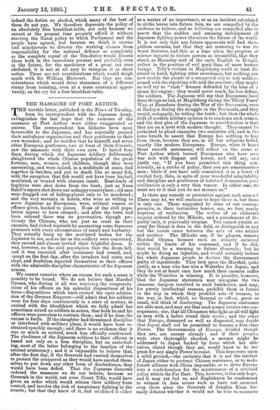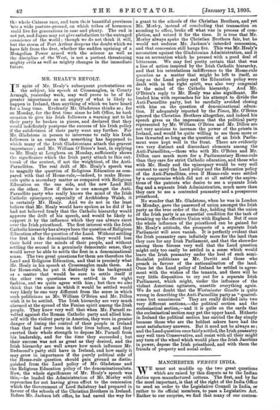THE MASSACRE OF PORT ARTHUR. T HE terrible letter, published in
the Times of Tuesday, from its correspondent with the Japanese Army, extinguishes the last hope that the rumours of the• massacre at Port Arthur were either exaggerated or untrue. The correspondent has hitherto been most favourable to the Japanese, and has especially praised their ambulance organisation and their gentleness to their own wounded ; and he testifies that he himself, and seven other European gentlemen, two at least of them Consuls, saw the massacre with their own eyes. It lasted four days, during which the Japanese soldiery deliberately slaughtered the whole Chinese population of the great fortress, men, women, and children, though they were unresisting, and were indeed, in a multitude of cases, tied together in batches, and put to death like so many fish, with the exception that fish would not have been hacked, mutilated, or treated with obscene insult. Boat-loads of fugitives were shot down from the bank, just as Nana Sahib's sepoys shot down our unhappy countrymen ; old men were dragged out of hiding-places only to be murdered ; and the very servants in hotels, who were as willing to serve Japanese as Europeans, were, without reason or offence given, hacked to pieces. None of the civil popu- lation appear to have escaped ; and after the town had been entered there was no provocation, though pre- viously the Chinese, who are just as cruel as their enemies, had risked reprisals by massacring some Japanese prisoners with every circumstance of insult and barbarity. They actually hung up the mutilated bodies for the Japanese to see, arias() far as the soldiery were concerned, they earned and almost invited their frightful doom. It was, however, on the civil population that the doom fell, and. it was executed after resistance had ceased, and, ,except on the first day, after the invaders had eaten and slept, and doubtless reported themselves to their officers with the admirable discipline characteristic of the Japanese armies.
We cannot conceive where an excuse for such a scene is possibly to be found. We do not believe that Marshal Oyama, who during it all was receiving the congratula- tions of his officers on his splendid dispositions of his force—dispositions which have excited the open admira- tion of the German Emperor—will admit that his soldiery were for four days continuously in a state of mutiny, so excited with the bloodthirst which we fully admit has sometimes seized on soldiers in action, that both he and his officers were powerless to restrain them ; and if he does, the excuse is futile. If the slaughter had threatened discipline or interfered with military plans, it would have been re- strained speedily enough ; and there is no evidence that it was so much as noticed, much less officially condemned. The obedience of the Japanese soldiers to their officers is based not only on a firm discipline, but on caste-feel- ing, most of the latter belonging to the families of the ancient aristocracy ; and it is impossible to believe that, after the first day, if the Generals had exerted themselves to protect the conquered as they would have exerted them- selves to put down any other form of disobedience, they would have been defied. That the Japanese Generals ordered the massacre we do not believe, because no Generals in the world, not even Count Tilly, would have given an order which would release their soldiery from control, and involve the risk of sanguinary fighting in the streets ; but that they knew of it, and condoned it either as a matter of no importance, or as an incident calculated to strike terror into future foes, we are compelled by the evidence to believe, and so believing are compelled also to assert that the sudden and amazing development of Japanese fighting-power threatens the future of the world. It is not only that any future opponents will find them pitiless enemies, but that they are restoring to war its worst features, and this at a time when the progress of science imparts to victors powers so irresistible, that they stand, as Macaulay said of the early English in Bengal, rather in the position of evil genii than of mere human beings. Tilly's victims in Magdeburg could at least die sword in hand, fighting other swordsmen, but nothing can now enable the people of a conquered city to defy soldiers armed with the repeating rifle and the revolver ; they might as well try to " rush " firemen defended by the hose of a steam fire-engine ; they would never reach, far less defeat, the soldiers. The Japanese will say that Europeans have done things as bad, at Magdeburg during the Thirty Years' War, at Barcelona during the War of the Succession, even at Badajos during the struggle in the Peninsula, and they would, unhappily, be telling the truth ; but then the whole drift of modern military opinion is to condemn such crimes, and the first plea of the Japanese to consideration is that they are on a level with modern thought. They cannot be permitted to plead examples two centuries old, and in the same breath to assert that Europe has nothing to fear from them, because they are, in all but religious belief, exactly like modern Europeans. Europe, when it hears those smooth assurances, will reflect on the scene at Port Arthur which turned Europeans who have seen war sick with disgust and horror, and will say, and justly say, "If you have permitted this thing con- sciously, as a stroke of policy, then you are conscienceless men ; while if you have only committed it in a burst cf excited fury, then, in spite of your wonderful adaptability and discipline and gentleness of habitual demeanour, your civilisation is only a very thin veneer. In either case, we must see to it that you do not menace us."
Is there any remedy or preventive against such scenes ? There may be, we will continue to hope there is, but there is only one. Those suggested by some of our contem- poraries, in their instinctive horror, are, we fear, nearly hopeless of realisation. The notion of an elaborate inquiry ordered by the Mikado, and a, punishment of the guilty only, is practically utopian. You cannot punish an army for things it does in the field, or distinguish in any but the rarest cases between the acts of one soldier and another. The Mikado can, if he pleases, remove Marshal Oyama because such an atrocity occurred within the limits of his command, and if he did, that would be a warning to future Generals ; but he might be doing an injustice, and would certainly induce the whole Japanese people to declare the Government guilty of ingratitude. They look upon the Marshal, quite justly, as a man who has won a Waterloo for Japan, and. they do not at heart care how much their enemies suffer while the Waterloo is winning. It is possible, however, 'that the Japanese statesmen may recognise the two immense dangers involved in such butcheries, and may, for purely intellectual reasons, prohibit them in future in the way in which they prohibit acts of treason, in the way, in fact, which no General or offiner, great or small, will think of disobeying. The Japanese statesmen are able men, and may see that such scenes involve two con- sequences; one, that all Chinamen who fight at all will fight as men with a halter round their necks ; and the other that Europe, dismayed as well as disgusted, may decide that Japan shall not be permitted to become a first-class Power. The Governments of Europe, divided though they are, are uneasy already ; and if their peoples were once thoroughly shocked, a menace might be addressed to Japan backed by force which her able rulers, elated though they are, would know to be too great for any single Power to resist. This hope rests upon a solid ground,—the certainty that it is not the interest of Japan either to protract Chinese resistance, or to make future alliance with China impossible, or to drive Europe into a confederation for the maintenance of a civilised policy within the Far East. This, however, is the only hope, and it may yet fail us, and Englishmen be condemned to witness in Asia scenes such as have not occurred even there since the Generals of Jenghis Khan for- mally debated whether it would not be wise to massacre th whole Chinese race, and turn their beautiful provinces iato a wide pasture-ground, on which tribes of horsemen 3ould live for generations in ease and plenty. The end is not yet, and Japan may yet give satisfaction to the outraged conscience of the world ; though we do not think it will, but the storm of Port Arthur deepens the doubt which we have felt from the first, whether the sudden uprising of a Mongolian Power armed with the science as well as the discipline of the West, is not a portent threatening mighty evils as well as mighty changes in the immediate future.



































 Previous page
Previous page